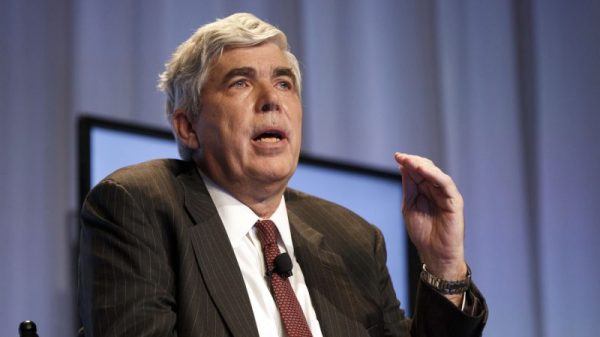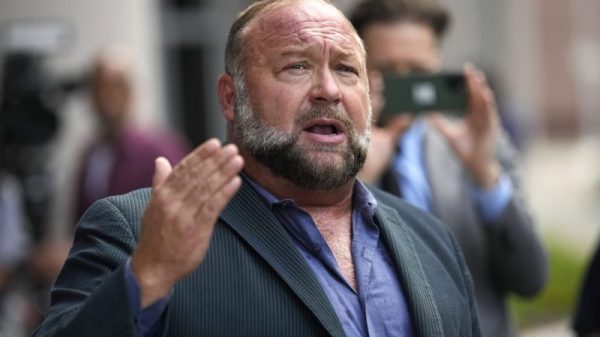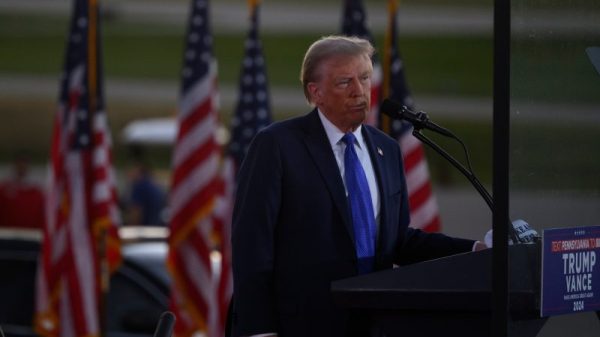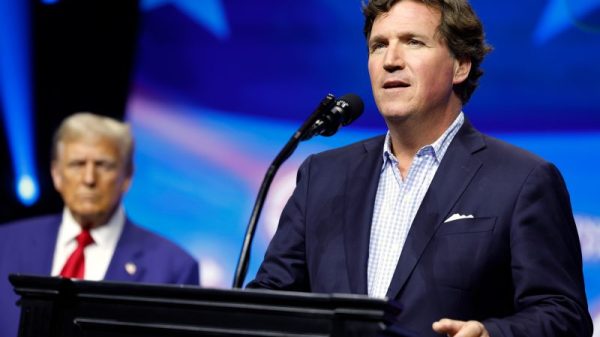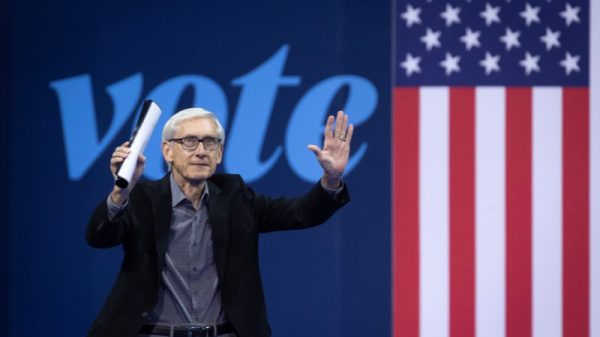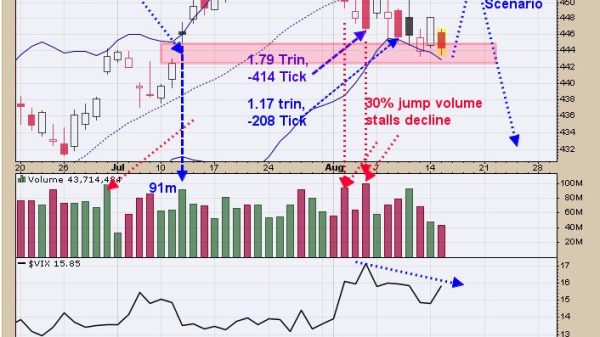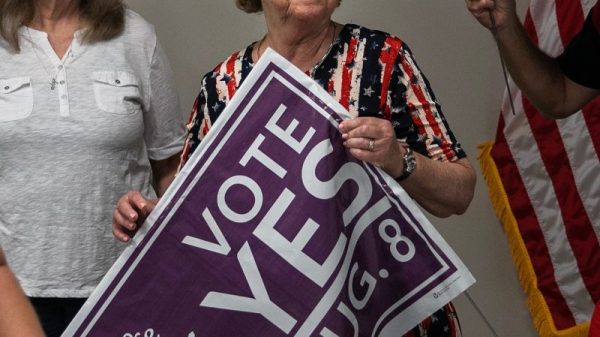President Biden won Michigan’s Democratic primary on Tuesday but faced a notable challenge from voters selecting “uncommitted” to protest his handling of Israel’s military campaign in Gaza, a potential sign of vulnerability for Biden among rank-and-file Democrats.
Democratic leaders in the state were bracing for tens of thousands of “uncommitted” votes, as Biden aides and allies sought to tamp down concerns about the strong showing by those aiming to warn the president he could lose the pivotal state in November if he does not change course and push for a cease-fire in Gaza.
With nearly 99 percent of the ballots counted, there were more than 100,000 “uncommitted” votes.
On the Republican side, former president Donald Trump continued his sweep of early primary contests, but former South Carolina governor Nikki Haley appeared poised to garner a significant share of the vote — an indicator of Trump’s own potential vulnerabilities in November’s general election.
In the weeks leading up to the Democratic primary, Arab American and liberal activists launched a concerted push to get Democrats to vote “uncommitted” as a way to protest Biden’s handling of the Israel-Gaza war, especially his decision not to call for a cease-fire. The group Listen to Michigan declared victory soon after polls closed, noting that it had surpassed its stated goal of 10,000 uncommitted votes.
“Our movement emerged victorious tonight and massively surpassed our expectations,” Layla Elabed, “Listen to Michigan” campaign manager and sister of Rep. Rashida Tlaib (D-Mich.), said in a statement Tuesday. “Tens of thousands of Michigan Democrats, many of whom who voted for Biden in 2020, are uncommitted to his re-election due to the war in Gaza.”
She added: “We don’t want a Trump presidency, but Biden has put [Israeli Prime Minister Benjamin] Netanyahu ahead of American democracy. We cannot afford to pay the bill for disregarding Palestinian lives should it come due in November.”
Biden campaign officials, however, said the group’s goal of 10,000 votes was artificially low, as 20,000 people have voted uncommitted in each of Michigan’s past three Democratic presidential primaries, even without any organized effort urging them to do so. The president’s allies also cited comments by some of those who threw their support behind the campaign that despite their anger at Biden’s policies, they plan to vote for him in November. A campaign official also noted that there were several “uncommitted” delegates for Barack Obama in 2012, coming from North Carolina, Maryland, Alabama and Kentucky.
Neither Biden nor Michigan Gov. Gretchen Whitmer, who is a co-chair of Biden’s reelection campaign, acknowledged the uncommitted vote in statements Tuesday evening, but they commended all those who voted.
“I want to thank every Michigander who made their voice heard today. Exercising the right to vote and participating in our democracy is what makes America great,” Biden said in a statement. He noted that Michigan’s coalition helped send him to the White House four years ago, touted his administration’s accomplishments and laid out the dangers of another Trump presidency.
Michigan is a critical swing state, and Biden’s path to the presidency would be far more difficult, if not impossible, if he loses it in November. Trump won Michigan in 2016 by nearly 11,000 votes. In 2020, Biden won the state by about 154,000 votes.
A Fox News poll in February found that in a Trump-Biden matchup, 47 percent of Michigan’s registered voters said they would support Trump, while 45 percent said they would back Biden.
Even before Tuesday, Democratic leaders had begun to worry about the president’s path to victory in Michigan, which has the country’s largest Arab American and Muslim population, because of deep anger over his unwavering support of Israel’s military campaign in Gaza, which has killed nearly 30,000 Palestinians, according to the Gaza Health Ministry.
Israel launched its military campaign after Hamas militants killed 1,200 people, many of them civilians, and took about 240 others hostage. Israel’s tactics in Gaza — including a siege of the enclave that has cut off access to most food, water, electricity and basic necessities such as medicine — have been widely condemned. Hundreds of thousands of Palestinians are at risk of starvation and disease.
Biden has continued to back Israel’s argument that it has the right to defend itself by destroying Hamas and its deep roots in Gaza. Still, the president has increasingly voiced public discomfort with the Israeli onslaught, saying that it has been “over the top” and that “a lot of innocent people are in trouble and they’re dying.” But such words are seen by many Arab American and liberal activists as woefully insufficient.
Listen to Michigan attracted a spate of high-profile endorsements in the final days before the primary, going beyond the Arab American community and including some of the Democratic Party’s prominent liberals.
Former Michigan lawmaker Andy Levin threw his weight behind the push to vote “uncommitted,” saying he hopes it will show Biden he needs to change course to win the state in November, as did Our Revolution, a successor to the organizing effort behind the presidential bid of Sen. Bernie Sanders (I-Vt.). Other notable Democratic lawmakers, including Tlaib, former presidential contender Beto O’Rourke, and former Ohio state senator Nina Turner, also have backed the movement.
Biden said this week that he hopes Israel and Hamas can agree by Monday to a long-awaited deal that would pause the fighting in Gaza for several weeks, while providing for the release of the remaining Israeli hostages and Palestinian prisoners held by Israel. But activists and Arab and Muslim American voters have said Biden must, at a minimum, call for a permanent cease-fire before they can begin to consider whether they will vote for him in November.
Two political protest movements have taken shape in Michigan in recent weeks to protest Biden’s handling of the Gaza war. Listen to Michigan has been focused on the uncommitted vote in the primary. Elabed, the group’s campaign manager, said the goal is to pressure Biden to change his policies and that she is open to supporting him in November if he dramatically changes course.
A second movement, called Abandon Biden, is working to deny the president a second term outright because of his support for Israel’s attack on Gaza and what the movement’s backers describe as a lack of empathy for Palestinian suffering. That group also supported the uncommitted campaign, but its members do not plan to vote for Biden in the fall.
Biden campaign officials said the number of uncommitted votes in Michigan will not change their general election strategy because they are not taking any votes for granted. The president has dispatched top aides in recent weeks to meet with members of the Arab American and Muslim communities and to conduct listening sessions, and campaign officials said those meetings will continue over the next several months.
But organizers hope their showing in Michigan will lend momentum to similar movements that have begun to arise in other Democratic primary states.
Trump did not travel to Michigan on Tuesday for the primary, though he held a rally there earlier this month. Trump also traveled to the state last fall, amid a strike by the United Auto Workers, to argue that he represents the interests of blue-collar workers far more than Biden does. (Biden walked a picket line in support of the strike, and the UAW endorsed him in January, though it is not clear if the union’s rank-and-file members will embrace the president.)
In remarks to the Michigan GOP, Trump said Tuesday night’s “numbers are far greater than we even anticipated” and thanked former ambassador and congressman Pete Hoekstra, who the Republican National Committee has recognized as the Michigan GOP chairman. Trump did not mention Haley.
“We have to win on November 5, and we’re going to win big, and it’s going to be like nothing that anybody has ever seen. It’s going to be fantastic,” Trump said, according to a transcript provided by his campaign.
Haley’s campaign, meanwhile, said Tuesday night’s results were a “flashing warning sign for Trump in November.” With nearly 99 percent of the ballots counted, she had nearly 27 percent of the vote.
“Let this serve as another warning sign that what has happened in Michigan will continue to play out across the country,” campaign spokesperson Olivia Perez-Cubas said.
The Michigan Republican Party has been engulfed in turmoil in recent months, and while Tuesday’s primary was relatively straightforward for the Democrats, its role in selecting delegates to the Republican National Convention is complicated.
The primary will allocate a total of 16 delegates on the Republican side, but the remaining 39 delegates will be allocated Saturday at a caucus of the state GOP. Because of an intraparty fight, however, two separate Republican conventions will take place, and it is not clear which slate will be recognized at the Republican National Convention in Milwaukee in July.












